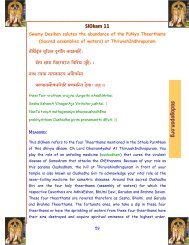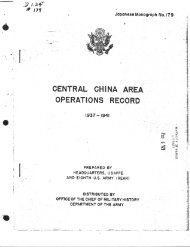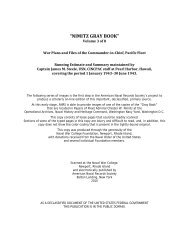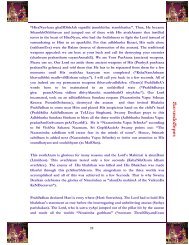- Page 1 and 2:
Volume III
- Page 3 and 4:
CONTENTS SlOkam 64 3 SlOkam 65 16 S
- Page 5 and 6:
. ïI>. . ïImte ramanujay nm>. .
- Page 7 and 8:
Slokam 64 AinvtIR inv&ÄaTma s, ïI
- Page 9 and 10:
not have any interest in pravRtti d
- Page 11 and 12:
samksheptre namah. The term samkshe
- Page 13 and 14:
form of moksham to the devotee who
- Page 15 and 16:
SrIvatsa vakshase namah. SrI BhaTTa
- Page 17 and 18:
vasah - SrI - all glory and riches,
- Page 19 and 20:
) SrI Samkara interprets the term "
- Page 21 and 22:
haktAnAm iti SrI-dah. SrI BhaTTar's
- Page 23 and 24:
1. paSyatAm deva devAnAm yayau vaks
- Page 25 and 26:
Sriyoh nidhIyanta iti SrI-nidhih -
- Page 27 and 28:
nAma 617. ïIxr> SrI SrI-dharah SrI
- Page 29 and 30:
SrI kRshNa datta bhAradvAj gives th
- Page 31 and 32:
in this nAma, to explain the signif
- Page 33 and 34:
Slokam 66 Sv]> Sv¼> ztanNdae niNdJ
- Page 35 and 36:
Alternatively, since bhagavAn has c
- Page 37 and 38:
their true Anandam. nAma 625. Jyaei
- Page 39 and 40:
going through all this suffering, j
- Page 41 and 42:
if the king can get the priests mar
- Page 43 and 44:
SrI cinmayAnanda points out that af
- Page 45 and 46:
and everything is His body, so ther
- Page 47 and 48:
continue to exist for ever and whic
- Page 49 and 50:
d) All the creatures (referred to b
- Page 51 and 52:
) His being adorned with all differ
- Page 53 and 54:
ehave: priyayA viyuktah strI sa'ngi
- Page 55 and 56:
Slokam 68 AicR:manicRt> k…MÉae i
- Page 57 and 58:
The mysterious truth (guhyam) about
- Page 59 and 60:
He is the One by reaching whom ther
- Page 61 and 62:
AtmA svarUpam yasya iti viSuddhAtmA
- Page 63 and 64:
form is protection of the beings (S
- Page 65 and 66:
called pradyumna. Thus, SrI satyade
- Page 67 and 68:
Slokam 69 kalneiminha zaEir> zUr> z
- Page 69 and 70:
called kAlanemi-nihA. e) The dharma
- Page 71 and 72:
nAma 650. zUr> SUrah The Valiant. S
- Page 73 and 74:
all the three worlds - trayANAm lok
- Page 75 and 76:
a grammatical rule - "keSAdvo'nyata
- Page 77 and 78:
f) SrI satyadevo vAsishTha has anot
- Page 79 and 80:
d) SrI satyadevo vAsishTha extends
- Page 81 and 82:
kAma-deva, one can develop the enri
- Page 83 and 84:
c) SrI satyadevo vAsishTha derives
- Page 85 and 86:
13-14: kadu stuvanta Rtayanta devat
- Page 87 and 88:
"By nature, He who has immense Merc
- Page 89 and 90:
nAma 664. vIr> vIrah a) The Valiant
- Page 91 and 92:
that is uttered several times daily
- Page 93 and 94:
seek Him above all other wealth lik
- Page 95 and 96:
Slokam 71 äü{yae äük«d!äüa
- Page 97 and 98:
The first line above refers to the
- Page 99 and 100:
1) He is Big, and 2) He makes every
- Page 101 and 102:
Doing all our actions through thoug
- Page 103 and 104:
visramsitAn uru bhayesalile mukhAt
- Page 105 and 106:
what it is to live a life of righte
- Page 107 and 108:
Other interpreters have used other
- Page 109 and 110:
Slokam 72 mha³mae mhakmaR mhateja
- Page 111 and 112:
(1. 1). SrI rAdhAkRshNa SAstri adds
- Page 113 and 114: The dharma cakram writer explains H
- Page 115 and 116: ) He Who has a great heart (uras),
- Page 117 and 118: detailed etymological derivation of
- Page 119 and 120: aham kratur-aham ya~jnah svadhAham
- Page 121 and 122: As in the previous nAma, the root f
- Page 123 and 124: the above five types of ya~jna-s wi
- Page 125 and 126: He also quotes from moksha dharma,
- Page 127 and 128: Slokam 73 StVy> Stviày> StaeÇ< St
- Page 129 and 130: and worthy of praise"; "tam viSva r
- Page 131 and 132: always be thinking of vishNu, and w
- Page 133 and 134: nammAzhvAr echoes this same sentime
- Page 135 and 136: clean, and is occupied by Him, that
- Page 137 and 138: motion or sound. The different inte
- Page 139 and 140: SrI Samkara comments that He has al
- Page 141 and 142: would only seek the chance to do ka
- Page 143 and 144: itipuNyah - pavitrah pApAnaviddhah
- Page 145 and 146: SrI Samkara also gives the interpre
- Page 147 and 148: Slokam 74 mnaejvStIwRkrae vsureta v
- Page 149 and 150: But in bhagavAn's case, none of the
- Page 151 and 152: mediate on them or recite their nam
- Page 153 and 154: protection of the virtuous". vasu a
- Page 155 and 156: etc. One could think of nAma 270 as
- Page 157 and 158: vAsudevAya namah. vimAna_vAsudhEvan
- Page 159 and 160: "ISAvAsyam idam sarvam yad-ki'nca j
- Page 161 and 162: the context of kRshNa incarnation,
- Page 163: phrase of nammAzhvAr: It is bhagavA
- Page 167 and 168: SlOkam 75 sÌit> sTk«it> sÄa sÑU
- Page 169 and 170: stealing butter, getting tied to th
- Page 171 and 172: aham smarAmi mad-bhaktam nayAmipara
- Page 173 and 174: BhagavAn is beyond all these bheda-
- Page 175 and 176: "BhagavAn is the supreme support fo
- Page 177 and 178: the interpretation that this nAma i
- Page 179 and 180: heart to sustain life. In fact, eve
- Page 181 and 182: the dwelling place of all these jIv
- Page 183 and 184: Slokam 76 ÉUtavasae vasudev> svaRs
- Page 185 and 186: and on the land. Those that fly in
- Page 187 and 188: nAma 716. Anl> an an-alah an alah a
- Page 189 and 190: SrI rAmAnujan also refers us to the
- Page 191 and 192: are engaged in intense tapas on Him
- Page 193 and 194: to in the previous nAma. The dharma
- Page 195 and 196: c) dRptah - He Who is proud. SrI rA
- Page 197 and 198: etween dhyAna and samAdhi, and is a
- Page 199 and 200: dhruvam vai brAhmaNe satyam dhruvA
- Page 201 and 202: Slokam 77 ivñmUitRmRhamUitR> dIÝm
- Page 203 and 204: expression of bhagavAn's Sakti, mos
- Page 205 and 206: dIptA a-prAkRta tejomayI mUrtih AkA
- Page 207 and 208: yasya avyaktam SarIram - He Whose b
- Page 209 and 210: shoDaSa strI sahasrANi Satamekam ta
- Page 211 and 212: His incarnations, He is called a-vy
- Page 213 and 214: ) He Who has provided many differen
- Page 215 and 216:
seen in different "faces" by the di
- Page 217 and 218:
of all kalyANa guNa-s, is pleased w
- Page 219 and 220:
naikAya namah (naikasmai namah in S
- Page 221 and 222:
e) He Who is of the form the soma s
- Page 223 and 224:
vasanti tatra bhUtAni bhUtatmanyakh
- Page 225 and 226:
that body as the Soul of the soul;
- Page 227 and 228:
SrI Samkara’s interpretation is:
- Page 229 and 230:
y brushing aside the water”. �a
- Page 231 and 232:
efers inthis context to the current
- Page 233 and 234:
AzhvAr declares that he does not wa
- Page 235 and 236:
e) One Who limits everything throug
- Page 237 and 238:
inds all things that are seen, for
- Page 239 and 240:
c) lokaih nAthyate yAcyate - He Who
- Page 241 and 242:
uttara nArAyaNam, kaushItakI brAham
- Page 243 and 244:
yasmAt lakshmyamSa sambhUtAh Saktay
- Page 245 and 246:
e) Under the current nAma, both SrI
- Page 247 and 248:
) In addition to giving the above i
- Page 249 and 250:
mANikkamE!En maradagamE! MaRRu oppA
- Page 251 and 252:
likewise are golden-hued. All the p
- Page 253 and 254:
d) He Who has a'ngada as His pleasi
- Page 255 and 256:
d) He Who leads the jIva-s to moksh
- Page 257 and 258:
hatavAn iti vIra-hA” - He Who des
- Page 259 and 260:
arrows of bhIshma aimed at arjuna w
- Page 261 and 262:
h) He is acyuta, Who neither slips
- Page 263 and 264:
the nAma as referring to "One Who g
- Page 265 and 266:
) SrI Sa'nkara's anubhavam is: na s
- Page 267 and 268:
) SrI Sa'nkara's interpretation is
- Page 269 and 270:
"He became the messenger to the pAN
- Page 271 and 272:
d) SrI kRshNa datta bhAradvAj uses
- Page 273 and 274:
It is noted again that SrI bhaTTar
- Page 275 and 276:
lOkaswAminE namah - adanur pranavak
- Page 277 and 278:
tri-loka-dhRte namah. a) SrI bhaTTa
- Page 279 and 280:
The dharma cakram writer explains m
- Page 281 and 282:
nAma 760. xNy> dhanyah The Blessed.
- Page 283 and 284:
then you must think of me as you th
- Page 285 and 286:
"tiRambAmal malai eDuttEnE ennum…
- Page 287 and 288:
SrI v.v. rAmAnujan explains the nAm
- Page 289 and 290:
physical beauty which stirs thought
- Page 291 and 292:
SrI satyadevo vAsishTha asks the rh
- Page 293 and 294:
pragrahah - One Whose acceptance (o
- Page 295 and 296:
……. rathAt avaplutya visRjya vA
- Page 297 and 298:
against obstacles from others”,fo
- Page 299 and 300:
explains the word nA separately as
- Page 301 and 302:
health because of the vedic chantin
- Page 303 and 304:
2. virAT refers to the sthUla form
- Page 305 and 306:
eferences: - “catur-bhujam udArA
- Page 307 and 308:
inner voice of conscience from His
- Page 309 and 310:
mahApurusha. d) He Whose Supremacy
- Page 311 and 312:
four forms of kRshNa or vAsudeva, b
- Page 313 and 314:
artha, kAma, and moksha. b) An alte
- Page 315 and 316:
h) He Who created the fit being - t
- Page 317 and 318:
dosham, we will briefly summarize t
- Page 319 and 320:
in its getting milk. The manifestat
- Page 321 and 322:
means ‘manifesting, revealing’.
- Page 323 and 324:
One Who knows the meanings of the v
- Page 325:
In his purusha sUkta vyAkhyAnam, Sr

















